#python programming book for beginners
Explore tagged Tumblr posts
Text
Proqramçı olmaq istəyirəm
Proqramçı olmaq istəyənlər üçün yol xəritəsini təqdim edirəm.
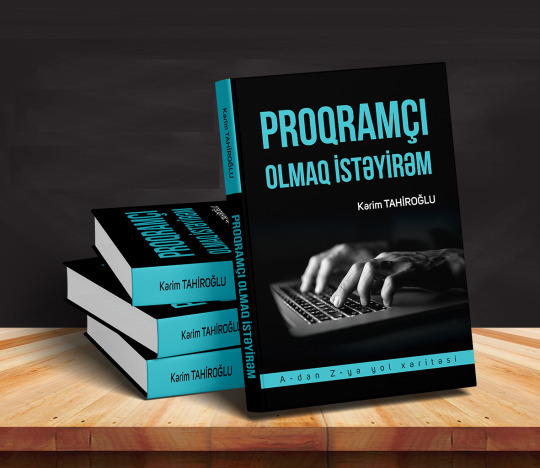
“Hər kəs proqramlaşdırmanı öyrənməlidir, çünki o sizə düşünməyi öyrədir”.
Stiv Cobs
Bu gün ən prestijli və ən çox qazandıran ixtisaslardan biri, bəlkə də, bi- rincisi proqramlaşdırmadır. Bu faktdan xəbərdar olan bir çox insanlar həvəsə gəlib proqramçı olmaq istəyirlər. Əlbəttə ki, hər bir işə başlamaq üçün həvəs yaxşı motivatordur, lakin uğur qazanmaq və müvəffəq olmaq üçün kifayət deyil.
Biz məsələyə daha konseptual yanaşacaq və proqramçı olmaq istəyənlərə dəyərli tövsiyələr verəcəyik.
Nə və niyə?
Proqramçı olmaq arzusuna düşənlərin ilk işi bu iki suala cavab tapmaq olmalıdır: nə və niyə? Proqramlaşdırma nədir və mən niyə proqramçı ol- maq istəyirəm? Sözsüz ki, hər bir insan seçəcəyi ixtisasın mahiyyətini dərk etməlidir. Proqramlaşdırma nədir, onun özünəməxsusluğu nədən ibarətdir, hansı çətinlikləri vardır? Bu suallara cavab tapmaq üçün əvvəlcə özünüz araşdırmalı və daha sonra peşəkar proqramçılarla görüşməlisiniz. Yalnız bundan sonra özünüzə “mən niyə proqramçı olmaq istəyirəm” sualını verə bilərsiniz. Bax bu zaman vicdanınız qarşısında tam səmimi olmalısınız. Əgər cavabınız çoxlu pul qazanmaqdırsa, siz ən yaxşısı tacir olmağı seçin. Çünki proqramlaşdırma bir həyat tərzidir, fərqli bir dünyadır. Ona aşiq olmadan bu yolun yolçusu olunmaz. Əgər cavabınız “proqramlaşdırma mənim düşüncə və həyat tərzimə uyğundur, mən özümü onda görürəm” olsa, bax bu başqa məsələ. Deməli, Siz proqramçı olmaq üçün doğulmusunuz…
Doğru yol və sağlam cığır
Bəs proqramçı olmaq üçün nə etmək lazımdır? Uzaq və yaxın məqsəd nədir? Nədən və necə başlamalı? Hansı proqramlaşdırma dilini öyrənməli, hansı kitabları oxumalı, hansı kurslara getməli? Növbəti mərhələdə bu suallara cavab tapmalısınız.
Proqramçı olmağa qərar verəndən sonra sizə bir neçə yol görünəcək. Siz doğru yolu seçməlisiniz. Məqsədə çatmaq üçün bir çox yollar var, amma bu şəxsdən şəxsə dəyişir. Hansı yolun Sizin üçün doğru olduğuna yalnız özünüz qərar verə bilərsiniz. Bunun üçün hansı sahə üzrə proq- ramlaşdırma ilə məşğul olacağınızı müəyyənləşdirin. Sahələr müxtəlifdir: tətbiqi, sistem, mobil, veb, oyun və s. Seçəcəyiniz sahə sizin yolunuzu müəyyənləşdirəcək, bu da öz növbəsində uzaq məqsədinizin nə olduğunu aydınlaşdıracaq.
Doğru yolu təsbit etdikdən sonra sizi o yola götürən sağlam bir cığırı tapmaq lazımdır. Başqa sözlə desək, yaxın məqsədləri müəyyən et- məlisiniz. Yaxın məqsədlər isə alqoritm anlayışı və proqramlaşdırmanın əsaslarına sahib olmaqdır. Bunun üçün ən asan proqramlaşdırma dilindən başlamaq məsləhətdir. Bu, Python ola bilər.
Kitab seçimi
Kitab seçimi çox önəmlidir. Elə bir kitab seçməlisiniz ki, Sizi yarıyolda qoymasın. Mütləq özü öyrənənlər və yeni başlayanlar üçün nəzərdə tutulan kitablardan istifadə etməlisiniz. İlk proqramlaşdırma kitabınızın dili çox sadə, həmçinin əyləncəli olmalıdır.
Özüm öyrənim, yoxsa kursa gedim?
Asan olmasa da, özünüzün öyrənməyiniz mümkündür. Bunun üçün iradə, nizam-intizam və səbir lazımdır. Əlbəttə, kursa getməklə təkbaşına öyrəndiklərinizi daha qısa zamanda öyrənə bilərsiniz. Kursa getməyə imkanınız yoxdursa, yenə də üzülməyin. Çox yaxşı onlayn kurslar da mövcuddur, həm də pulsuz.
Təcrübə, təcrübə, təcrübə
Proqramlaşdırmanı yaxşı öyrənmək üçün bu işin nəzəriyyəsini, fun- damental əsaslarını və konsepsiyasını çox yaxşı bilməlisiniz. Proqramlaş- dırmanı yaxşı bacarmaq üçün isə bol-bol praktika lazımdır. Necə ki, yaxşı piano çalmaq üçün çox piano çalmaq lazımdır. Eləcə də yaxşı proqram yazmaq üçün çoxlu proqram yazmaq lazımdır. Uzun sözün qısası, daima alqoritm tərtib etmək bacarığınızı təkmilləşdirməli və proqramlaşdırma məntiqinizi inkişaf etdirməlisiniz. Bunun üçün müxtəlif çətinlik dərəcəli məsələləri həll edin, fərqli və optimal həll yollarını axtarın, eksperimentlər aparmaqdan çəkinməyin. Əlavə olaraq müxtəlif proqramlaşdırma yarışla- rında iştirak edin. Bütün bunlar həm təcrübənizi, həm də özünüzə inamınızı artıracaq.
Əlavə resurslar
Bir tərəfdən proqramlaşdırın, digər tərəfdən də öyrənməyə davam edin. Forumlara üzv olun, bloqları izləyin, videodərslərə baxın. Bir sözlə, daim araşdırın və əlavə resurslardan hər zaman istifadə edin. Bu şəkildə biliklərinizi daha da zənginləşdirmiş olacaqsınız.
Bir mürşidiniz olsun
Tanıdığınız (real və ya virtual) ən azı bir peşəkar proqramçı olsun. Rahat sual verə bildiyiniz, məsləhət aldığınız, sizə yol göstərən bir proqramçı. Amma siz onu primitiv suallarınızla bezdirməyin. Əvvəlcə özünüz araşdırın, sualınıza cavab tapa bilməsəniz, bir də araşdırın. Araşdırmanız nəticəsiz qalsa, bir daha sınayın. Yalnız 3-cü uğursuz cəhddən sonra mür-şidinizdən soruşun.
Bildiklərinizi paylaşın
Bilik paylaşdıqca artır. Bu qızıl qaydanı unutmayın. Siz də bildiklərinizi bu yolun yolçuları ilə bölüşün. İnanın, bunun sizə də faydası olacaq. Bilik- ləriniz həm yenilənəcək, həm də canlı qalacaq.
Günün nəbzini tutun
Proqramlaşdırma ilə bağlı hər şeyi izləyin, dəyişiklik və yeniliklərdən xəbərdar olun. Unutmayın ki, proqramlaşdırma dilləri də gün keçdikcə inkişaf edir, daha da zənginləşir.
Layihələr
Nəzəri biliklər və müəyyən dərəcədə praktiki vərdişlər əldə etdikdən sonra layihələrə başlaya bilərsiniz. İlkin olaraq kiçik layihələrdən başlamağınız məsləhətdir. Unutmayın, məsələ layihənin kiçikliyində və ya böyüklüyündə deyil. Əsas odur ki, başladığınız işi yarımçıq qoymayasınız. Hətta ən kiçik layihəni belə inkişaf etdirərək kifayət qədər ciddi proqram məhsulu halına gətirmək mümkündür. Burada əsas məsələ prosesin özüdür. Layihə boyunca qarşılaşdığınız problemləri anlamaq, onların həll yollarını tapmaq, bu həllərdən optimal olanını seçmək, addım-addım layihənin qarşınızda şəkillənməsi, onun təkmilləşdirilməsi… Bütün bunlar sizə tərifolun- maz həyəcan verəcək, zövq yaşadacaq.
Startaplar
Artıq bir neçə müstəqil layihəniz olduqdan sonra startap komandalarına da qoşula bilərsiniz. Bu sizə həm təcrübə qazandıracaq, həm komanda ruhu aşılayacaq, həm də əgər bəxtiniz gətirsə, pul qazandıracaq.
Təcrübə proqramları
Müəyyən səviyyəyə gəldikdən sonra hökmən şirkətlərin elan etdiyi pullu və ya pulsuz təcrübə proqramlarına qoşulun. Gələcək karyeranız adına bu çox uğurlu bir başlanğıc ola bilər. Bu zaman həm real təcrübə qazanar, həm də CV-nizə fəxrlə bir referans əlavə etmiş olarsınız. Hətta bəxtiniz gətirsə, təcrübə keçdiyiniz şirkət sizə real iş təklifi də edə bilər.
Sertifikatlar
Əsas bilik və bacarıqlardır, sertifikat o qədər də vacib deyil. Bu fikir, əsasən, doğrudur. Amma bilik və bacarıqlara yiyələndikdən sonra sertifikatlar əldə etmək sizin peşəkarlığınızın real göstəricisi ola bilər. Şirkətlərə iş müraciətlərində, eləcə də müqavilə şərtlərində bu sertifikatların təsiri çox böyükdür. Digər tərəfdən sertifikat imtahanlarına hazırlaşarkən bilik- lərinizi sistemləşdirmiş olacaqsınız.
İşə düzəlmə
Proqramlaşdırma peşəkar fəaliyyətdir. Proqramçı olmaq arzusu ilə çıxdığınız bu yolun bir mənzili, məntiqi nəticəsi olmalıdır. Bu da, təbii ki, işə düzəlməkdir. Uğurlu karyera qurmaq üçün bura qədər verdiyimiz məsləhətlərə hərfiyyən əməl etməlisiniz. Yalnız bu zaman iş müsahibələrində özünəinamınız güclü olacaq. İmkanlarınızı layiqincə qiymətləndirin və iş təkliflərinə praqmatik yanaşın. Sizə uğurlar!
“Proqramçı olmaq istəyirəm” kitabı səh. 14–18 (Kərim Tahiroğlu)
#programming#coding#beginner#programming languages#software development#python#azerbaycan#programming book
1 note
·
View note
Note
hi!! do you have any free resources or textbooks for learning python? i’m doing my dissertation and i need a refresher before i start doing it properly. thanks!!
Hiya! 💗
Here you go:
Book
Python Objects and Classes
Roadmap.sh
Random Python Resources
Top 20 Python Projects for Beginners to Master the Language
Free Programming Books
Python Notes and Resources by @trialn1error
Python Official Roadmap
Python Project List
Python 3 Cheat Sheet
Python Cheatsheet for Beginners
These are the ones' I've shared on my blog over the years! Hope their helpful! 🥰👍🏾💗
#my asks#resources#python resources#codeblr#coding#progblr#programming#studying#studyblr#learn to code#comp sci#tech#programmer
349 notes
·
View notes
Text
"Python Course for Beginners" with Estefanía ...
youtube
Post #102: YouTube, Estefanía Cassingena-Navone, Learn Python In 2 Hours, 2023.
Estefanía is one of my favourite programming instructors. She explains step by step and visualizes wonderfully. I also like her voice and how she gets to the heart of the learning content. I have booked several coding courses on Udemy which are really excellent.
#i love coding#programming#coding#learning#education#i love programming#coding is fun#programming language#i love python#coding for kids#Youtube
50 notes
·
View notes
Text
Trying to learn Python programming for the third time.
I started with a beginner course on Udemy. Previously, I attempted to learn Python twice using books and online resources, but I gave up because I lost interest. This time, I’m determined to complete the course and become a Python programmer, at least at a beginner level.
9 notes
·
View notes
Text



tune into megumi.fm ?
💗 about me
name: meg/megumi age: 20+ pronouns: he/she/they currently: MSc Biotechnology languages: english, hindi, korean (beginner)
🌙 interests
subjects (academic): structural biology, network theory, programming (mainly python, a little bit of R), organic chemistry, genomics subjects (non-academic): mythology, etymology, literature, film studies and screenplay, animation hobbies: reading, singing, dancing, listening to music, watching video essays on youtube other interests: kdramas, jdramas, anime, kpop, indian classical music, indie games
📚 academic goals
short term - getting through my masters degree long term - getting a PhD (hopefully)
🦋 personal goals
- tracking my finances and learning to spend less - learning to cook healthy food that I personally enjoy eating - movement! learning lots of kpop dances - reading lots of books, and exploring new genres - developing a mini game
📍 navigation:
- Academic progress trackers (+liveblogging) - Internship progress trackers - Misc to-dos - Resources - Adventures in journalling - Interactions with besties archived - 2024 weekly tracker - Tatami Galaxy Challenge - Apr'24 Habit Tracker - 2023 daily tracker
#abt me <3#get to know me#digital journaling#introductory post#studyblr#study blog#bookblr#codeblr#desi studyblr#desi academia#stemblr#stem kid#megumi.fm#studyspo#studyblr intro post#studyblr introduction
102 notes
·
View notes
Text
Gear Up! A Beginner's Guide to Learning Robotics
Hey Tech Enthusiasts!
Are you fascinated by robots and want to dive into the world of robotics? Learning robotics can seem daunting, but with the right resources and mindset, you can get started!

Step 1: Understand the Basics
- Familiarize yourself with programming languages like C++, Python, or Java
- Learn about electronics, circuitry, and microcontrollers (e.g., Arduino, Raspberry Pi)
- Get a grasp on mechanical concepts (e.g., kinematics, dynamics)
Step 2: Choose Your Path
- Robotics kits (e.g., Lego Mindstorms, Makeblock)
- Online courses (e.g., Coursera, edX, Udemy)
- Books (e.g., "Robotics, Vision & Control" by Peter Corke)
- Join online communities (e.g., Reddit's r/robotics, r/learnprogramming)
*Step 3: Practice & Build*
- Start with simple projects (e.g., line follower, robotic arm)
- Experiment with sensors, actuators, and control systems
- Join robotics competitions or hackathons
Step 4: Network & Learn from Others
- Attend robotics conferences, meetups, or workshops
- Collaborate with fellow robotics enthusiasts
- Participate in online forums
Resources:
- Code.org's Robotics Course
- Robotics Academy
- Robot Operating System (ROS)
Inspiration:
- Boston Dynamics' robots
- NASA's Robotics Alliance Project
- Robot Wars
Conclusion:
Learning robotics takes time, patience, and dedication. Stay curious, persistent, and creative!
What's your favorite robotics project or resource? Share in the comments!
[Reblog if you're interested in robotics!]
3 notes
·
View notes
Text
Hot take : books have too many words
Now that I have your attention, I'm talking about instructional books. Non-fiction books with the purpose of teaching a skill.
Representative example : Automate The Boring Stuff With Python by Al Sweigart. Ostensibly, this is an application-(pun intended)-forward approach to teaching/learning how to program.
Guess on what page, excluding indexes, excluding the forward, you're asked to actually write a single program.
Page 56. Question 9 of the practice questions on the final page of chapter two. And it's a simple if, elif, else decision tree. I bought this book used and the previous owner stopped bookmarking and highlighting on page 41. They didn't write a single line of code themselves.
This isn't a problem unique to this book, it's a criticism I have of most books like this. My criticism of this book is in how similar it is to every other programming book for beginners. But this isn't just true of this domain, it's true of music, it's true of drawing, it's true of painting, it's true of creative writing, second languages, any skill you can learn. I've spent the last year and a half just trying to learn how to do new things as an adult and it's been more and more of this schlock.
I am a firm and committed believer in books, and I think digital learning tools are at best a poor substitute in a pinch. But this is not the way.
Fact of the matter is that humans are really bad at high-level concepts. We are bad at making them, we are bad at communicating them, and we are bad at learning them and drawing conclusions from them. So many highly educated people I know in my field are dumb as rocks because of this.
Learning a new skill happens from repetition. It's a training regimen that involves frequent direct instruction, but it should be at least 50% training.
Imagine if I were your personal trainer (gym) and our first week I just spent every day talking about proper form, nutrition, muscle groups, etc., without you actually doing anything. It may or may not be useful information but you won't have retained much and you wouldn't have grown at all in your fitness!
Gotta put my money where my mouth is and write books...
3 notes
·
View notes
Text
Computer Programming And Cyber Security for Beginners: This Book Includes: Python Machine Learning, SQL, Linux, Hacking with Kali Linux, Ethical Hacking. Coding and Cybersecurity Fundamentals
http://i.securitythinkingcap.com/TCbB6k
3 notes
·
View notes
Text
My Recommended Pathway to Learning Code
Why Learn to Code?
Unleash Creativity: Coding is like painting with words. You get to create digital masterpieces, bring ideas to life, and build things you've always imagined.
Problem-Solving Superpower: Ever felt the satisfaction of solving a puzzle? Coding is a series of problem-solving adventures where you're the hero armed with logic and creativity.
Endless Possibilities: From websites to apps, games, and beyond, coding opens doors to endless possibilities. Imagine the impact you can make in the digital realm!
Where to Begin?
Starting your coding journey can be overwhelming, and I don't blame you for thinking so. Begin with these beginner-friendly languages:
HTML/CSS: The dynamic duo for web development. HTML structures content, while CSS styles it. Perfect for creating your first website. Think of HTML as the structure for a building. The frame, if you will. CSS will be the decor of it all.
JavaScript: The language of the web. It adds interactivity to your sites, making them dynamic and engaging.
Python: A versatile language, loved for its readability. Great for beginners and used in various fields, from web development to data science.
The Importance of Learning Foundations:
Think of coding as building a house. You wouldn't start with the roof, right? Learning foundational languages like HTML, CSS, and JavaScript is like laying a strong foundation. Here's why it matters:
Understanding the Basics: Foundations teach you the core concepts of programming, helping you understand how code works.
Transferable Skills: The skills you gain are transferable to other languages. Once you grasp the logic, moving on becomes a smoother journey. You can't read a book if you don't know the alphabet.
Confidence Booster: Starting with the basics builds confidence. It's like leveling up in a game – you become more adept and ready for the next challenge.
Problem-Solving Mindset: Foundations instill a problem-solving mindset. As you conquer challenges, you develop a resilient approach to coding conundrums.
Starting up:
I highly recommend using what you have on hand. Notepad on Windows works great but if you'd like something more code based try out:
Notepad++
Sublime
Visual Code Studio
Coffee Cup
Atom (This has been sunset though, so use at your own risk)
Any questions? Please feel free to message me! I might take 24 hours to respond, but I will get back to you!
#CodingJourney#HTML#CSS#JavaScript#Python#WebDevelopment#learn#pathway#recommendation#cs#computer#science#compsci#programming#edu#educational#codeblr#studyblr
10 notes
·
View notes
Text
Make Your Own C64 Dungeons!
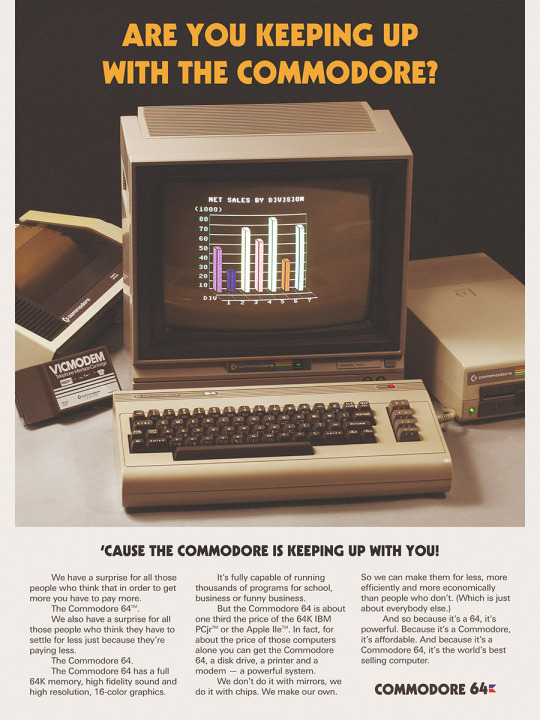
I recently came across a fun YouTube video about programming in basic/python using an 80s guidebook (thanks YouTube algorithm).
P.S. the Commodore 64 had a radical advertising campaign!
Peak '80s Fantasy
The book they were using was published by Usborne Books in the early '80s and is part of a series which are available as free PDF downloads on their website. I was immediately enthralled by:
Write Your Own Fantasy Games For Your Microcomputer: "Dungeon of Doom"

This hit me so hard with the '80s TSR/Games Workshop vibes I almost passed out.
As I dug into the ~50 page book I was not disappointed. It's full of fun art, wonderful layout spreads, and very useful guidance.
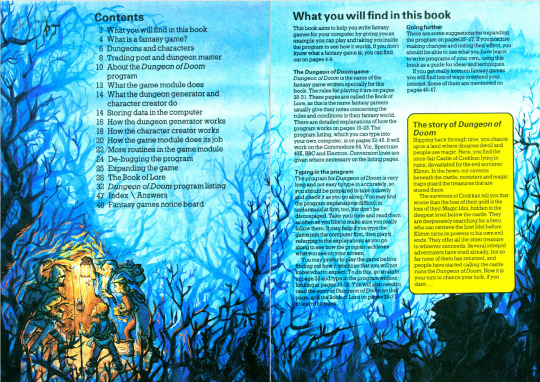
The book starts off talking about what a TTRPG is and outlines the tenants of your standard fantasy D&D-style game.
However it also points out that different genres besides fantasy can be played in, which I appreciated.
The way it all works is here; the dungeon levels, the classes, the monsters, the treasure!
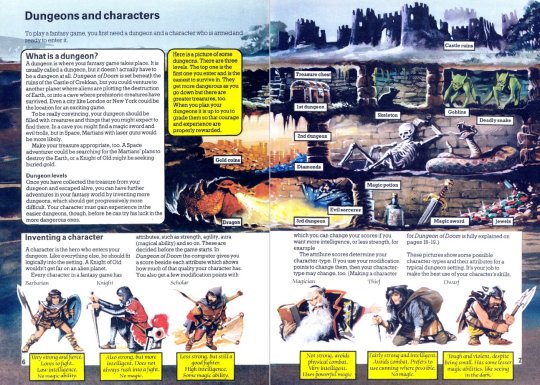
Okay, So I Can't USE It Per Se...
Now, I don't have an coding experience, so using this book for its intended purpose would be tough for me. I majored in English after all, this kind of stuff confuses the heck outta me.
That said, these books are for beginners so with a little work and a C64 emulator I'm sure I could figure it out. Maybe I will someday, but I think it has a lot of value in another way.
Teaching The Flow
As someone who has written a few games, and read a few more, I've become really familiar with good instructions and how they are useful anywhere.
In it's explanation of the flow of player input and computer response it lays out the exact kind of procedures we in the OSR are always harping on about.
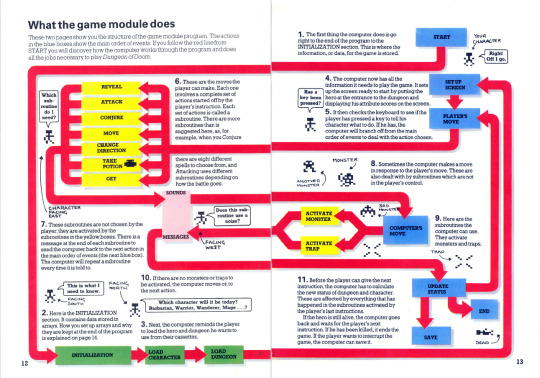
It's got me thinking that flow charts are something I should just use in my game design. Bulleted lists are all well and good, but curved arrows! That's the stuff.
I think most kinds of modules would benefit from this kind of spread too, especially anything with a strong narrative arc.
I will point out that a couple WoTC 5e modules do think to use this method, but commit to it so poorly that the sparse chart is nearly useless (I'm looking at you Descent into Avernus).
Well That's Basically It
I don't have too much more on this subject other than "Look at this book!" and "Wow, everyone should incorporate the lessons here in their writing!"
Maybe I can convince one of my friends who actually knows programming to help me and we can create our own Dungeon of Doom computer game?
It can't be that hard to make a video game right...
2 notes
·
View notes
Text
Hands-On Data Science: Practical Steps for Aspiring Data Scientists
Embarking on the journey to study data science may initially seem like a complex and challenging task, but with a strategic approach, it can become a rewarding and accessible endeavor. Choosing the Best Data Science Institute can further accelerate your journey into this thriving industry. Let's explore a roadmap that can make your data science learning experience smoother and more manageable, breaking down the process into actionable steps.
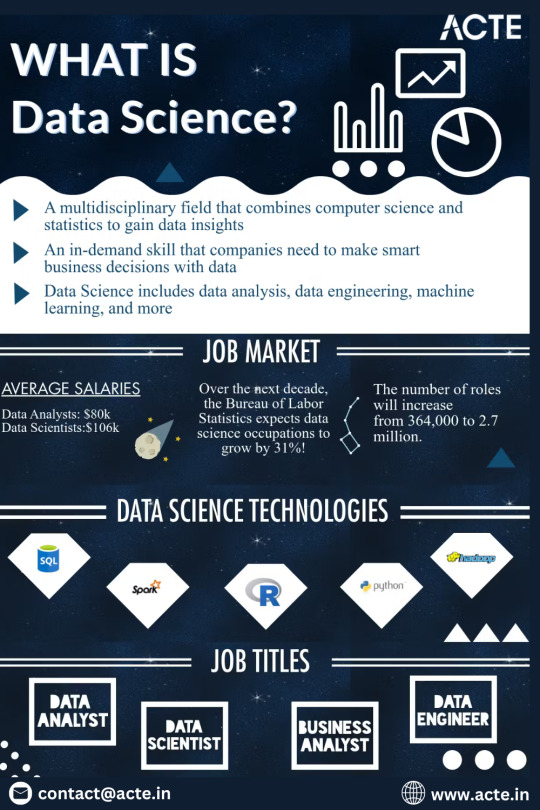
1. Start with the Basics: Lay a Solid Foundation in Mathematics and Statistics
Commence your data science journey by establishing a robust foundation in the essentials of mathematics and statistics. Grasp fundamental concepts such as linear algebra and probability, which serve as the bedrock for advanced data science algorithms.
2. Learn a Programming Language: Begin Your Coding Journey with Python or R
Acquire proficiency in a programming language widely used in data science, such as Python or R. These languages are renowned for their user-friendliness and come equipped with extensive libraries and resources tailored for data science enthusiasts.
3. Explore Online Learning Platforms: Enroll in Accessible and Structured Courses
Embark on your learning adventure by enrolling in online courses specifically designed for beginners. Platforms like Coursera, edX, and ACTE Technologies offer a plethora of courses crafted by top universities and industry experts, covering fundamental topics like "Introduction to Data Science."
4. Hands-On Projects: Apply Theoretical Knowledge Through Real-world Applications
Translate theoretical knowledge into practical skills through hands-on projects. Platforms like Kaggle provide datasets and challenges that allow you to apply and implement what you've learned, solidifying your understanding through real-world applications.
5. Utilize Data Science Libraries: Master Essential Tools
Familiarize yourself with popular data science libraries in Python, such as Pandas, NumPy, and Scikit-Learn. These libraries simplify complex tasks and are widely adopted in the industry, making them indispensable tools in your data science toolkit.
6. Read Widely: Supplement Learning with In-Depth Resources
Enhance your online learning by delving into books on data science. Resources like "The Data Science Handbook" and "Python for Data Analysis" offer valuable insights into best practices and real-world applications. Follow reputable data science blogs to stay informed on emerging industry trends.
7. Engage with the Community: Join Forums and Discussions to Foster Connections
Immerse yourself in the vibrant data science community through platforms like Stack Overflow and Reddit. Actively participate in discussions, pose questions, and learn from the experiences of fellow enthusiasts. Networking is a valuable component of the learning process, offering diverse perspectives and insights.
8. Specialize Based on Interest: Explore and Deepen Your Understanding
As you advance in your studies, explore different areas within data science based on your interests. Whether it's machine learning, data engineering, or natural language processing, find a niche that resonates with your passion and curiosity.
9. Continuous Learning: Cultivate a Lifelong Learning Mindset
Recognize that data science is an ever-evolving field. Cultivate a mindset of continuous learning. Stay curious, explore advanced topics, and keep yourself updated on the latest industry developments to remain at the forefront of the field.
10. Practice Regularly: Consistency is Key to Mastery
Consistency is paramount in mastering data science. Dedicate regular time to your studies, practice coding, and engage in projects consistently. Building a habit ensures steady progress and reinforces your skills over time, enabling you to tackle increasingly complex challenges.

In conclusion, mastering data science is a journey that involves a combination of theoretical understanding, practical application, and a commitment to continuous learning. By following this roadmap and breaking down the learning process into manageable steps, you can navigate the world of data science with confidence and ease. Remember that the key to success lies not only in the destination but in the learning and growth that happens along the way. Choosing the best Data Science Courses in Chennai is a crucial step in acquiring the necessary expertise for a successful career in the evolving landscape of data science.
2 notes
·
View notes
Text
What Are Some Easy Python Program Ideas for Beginners?
Python has become one of the most widely used programming languages in the world, and for good reason. Its syntax is simple, the learning curve is gentle, and it offers countless opportunities in fields like data science, AI, automation, and web development. But for beginners, getting started often raises a big question: What should I build first?
If you're exploring Python training online or pursuing an Online Certification in Python, knowing what to practice can make a huge difference. In this blog, we’ll walk you through easy Python program ideas that are perfect for building your confidence and strengthening your foundational skills. Whether you're preparing for a Python certification course or simply looking to experiment with Python projects, these ideas will guide you.
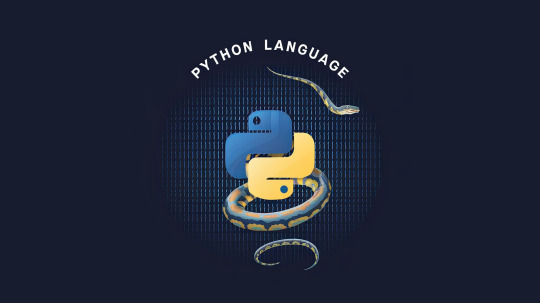
Why Start with Simple Python Programs?
Before we dive into the actual Python program ideas, it’s essential to understand why beginner-friendly projects are a vital part of your learning journey:
Hands-on Practice: Reading tutorials helps, but coding builds muscle memory.
Build Confidence: Seeing a working output motivates you to try more.
Learn Debugging: Real-world code rarely runs error-free the first time.
Prepare for Certification: Practical exercises strengthen your theoretical knowledge.
According to industry surveys, over 70% of Python learners who work on real projects during training feel more prepared for interviews and job roles.
What You Need Before Starting
To implement the following Python program ideas, you need:
Python installed on your machine
A basic understanding of syntax, variables, conditionals, loops, and functions
Any code editor like IDLE, VS Code, or even Notepad++
Once you’re set up, you're ready to explore some of the Top Online Python Courses or get started on your own using these program ideas.
Easy Python Program Ideas for Beginners
1. Number Guessing Game
Purpose: Learn conditional statements, loops, and user input.
python
import random
number = random.randint(1, 10)
guess = int(input("Guess a number between 1 and 10: "))
while guess != number:
guess = int(input("Wrong! Try again: "))
print("Congratulations! You guessed it right.")
✅ Concepts used: input(), while, random
2. Simple Calculator
Purpose: Understand functions and basic math operations.
python
def add(x, y):
return x + y
def subtract(x, y):
return x - y
num1 = float(input("Enter first number: "))
num2 = float(input("Enter second number: "))
operation = input("Choose operation (+ or -): ")
if operation == '+':
print("Result:", add(num1, num2))
elif operation == '-':
print("Result:", subtract(num1, num2))
else:
print("Invalid operation")
Concepts used: Functions, conditionals, float
3. Palindrome Checker
Purpose: Practice string slicing and conditions.
python
word = input("Enter a word: ")
if word == word[::-1]:
print("It’s a palindrome!")
else:
print("Not a palindrome.")
Concepts used: Strings, slicing, comparison
4. To-Do List (CLI)
Purpose: Learn lists, loops, and dynamic data.
python
tasks = []
while True:
task = input("Add a task or type 'exit' to quit: ")
if task == 'exit':
break
tasks.append(task)
print("Your tasks:")
for t in tasks:
print(f"- {t}")
Concepts used: Lists, loops, string formatting
5. Fibonacci Sequence Generator
Purpose: Learn recursion or loops.
python
def fibonacci(n):
a, b = 0, 1
for i in range(n):
print(a, end=" ")
a, b = b, a + b
fibonacci(10)
Concepts used: Loops, variable swapping
6. Basic Contact Book
Purpose: Work with dictionaries and basic CRUD operations.
python
contacts = {}
def add_contact(name, number):
contacts[name] = number
add_contact("Alice", "1234567890")
add_contact("Bob", "9876543210")
print("All Contacts:", contacts)
Concepts used: Dictionaries, functions
7. Even or Odd Checker
Purpose: Strengthen conditional logic.
python
num = int(input("Enter a number: "))
if num % 2 == 0:
print("Even number")
else:
print("Odd number")
Concepts used: Modulus operator, if-else
8. Simple Alarm Clock (Text-based)
Purpose: Use time module and while loop.
python
import time
alarm_time = input("Set alarm time (HH:MM:SS): ")
while True:
current_time = time.strftime("%H:%M:%S")
if current_time == alarm_time:
print("Wake up!")
break
Concepts used: time module, infinite loops
9. Temperature Converter
Purpose: Reinforce user input and math.
python
celsius = float(input("Enter temperature in Celsius: "))
fahrenheit = (celsius * 9/5) + 32
print(f"{celsius}°C is {fahrenheit}°F")
Concepts used: Math operations, float formatting
10. Quiz Game
Purpose: Practice decision-making and loops.
python
questions = {
"What is the capital of France?": "Paris",
"2 + 2?": "4"
}
score = 0
for q, a in questions.items():
user_ans = input(q + " ")
if user_ans.lower() == a.lower():
score += 1
print(f"Your score is {score}/{len(questions)}")
Concepts used: Dictionary, for loop, string methods
Why These Programs Matter in Python Training
These programs are not just academic exercises. They reflect real-world scenarios and are frequently used to prepare students for:
Python certification exams
Technical interviews
Project-based assessments
Building foundational knowledge before diving into advanced topics
Each project reinforces logic building, syntax practice, and confidence, essential qualities for anyone enrolling in a Python certification course or pursuing Python training online.
Tips to Get the Most Out of Your Python Learning
Start Small: Begin with 10-15 line scripts and gradually expand.
Break Down Problems: Use pseudocode or plain English steps.
Practice Daily: Consistency matters more than duration.
Debug Often: Learn to read error messages and fix issues.
Refactor Your Code: Revisit old code to improve logic and style.
Real-World Value of Learning Python
Python is used in diverse fields from web apps to artificial intelligence. A recent developer survey showed:
Python is the #1 programming language for learners worldwide.
Over 90% of data science professionals rely on Python.
Companies report a shorter hiring process when candidates come with project experience.
That’s why more professionals are enrolling in Online Certification in Python to ensure job-readiness.
Expand These Ideas into Projects
If you’re already confident with these Python program ideas, you can extend them into more detailed projects:
Turn the To-Do List into a file-saving task manager
Convert the Quiz Game into a GUI application
Integrate the Alarm Clock with sound or notifications
Projects like these will help you stand out in any Python online certification program or job application.
Key Takeaways
Start with simple Python projects like number guessing, calculator, or quiz games.
Apply core concepts like loops, conditionals, functions, and data structures.
These projects build a strong foundation for more complex programming challenges.
Practical coding experience prepares you for Python certifications and career success.
Ready to Build Your Python Skills?
Enroll in H2K Infosys’ Python certification course to turn your basic skills into professional-level expertise. Get hands-on training, project experience, and job placement support all in one place.
👉 Start your Python journey with H2K Infosys today!
#PythonProgramming#LearnPython#PythonProjects#PythonForBeginners#PythonCode#PythonDeveloper#PythonCoding#PythonTutorial#CodingForBeginners#PythonBasics#PythonChallenge#PythonCourse#PythonCertification#PythonTrainingOnline#OnlineCertificationInPython#TopOnlinePythonCourses#PythonProgramIdeas#CodeNewbie#100DaysOfCode#WomenWhoCode
0 notes
Text
Learn Python Programming | Start Your Coding Journey
In the modern tech-driven world, learning programming is no longer just an added skill—it’s a necessity. Whether you’re a student, a working professional, or someone looking to make a career shift, mastering a programming language can be your ticket to numerous high-paying opportunities. Among all the programming languages available today, Python stands out as one of the most versatile, beginner-friendly, and powerful options. If you're thinking of diving into the world of coding, there's no better place to start than with Python.
This blog will guide you through the benefits of learning Python, what makes it an ideal first language, and how you can kickstart your journey, especially if you're based in a tech-savvy hub like Chandigarh.
Why Choose Python?
Python is a high-level, interpreted programming language known for its simple syntax and readability. It is widely used in various domains such as web development, data science, artificial intelligence, automation, game development, and more. Here are a few reasons why Python is the perfect starting point:
Easy to Learn and Use: Python’s syntax is clean and closely resembles the English language, making it easier for beginners to understand and write code without getting overwhelmed.
Massive Community Support: With millions of users worldwide, Python has a vibrant community. You’ll find endless tutorials, forums, libraries, and documentation to support your learning.
Versatile and Powerful: Python is used by some of the biggest tech giants like Google, Netflix, Facebook, and Instagram. Its applications range from small scripts to large-scale enterprise solutions.
High Demand in Job Market: Python developers are in high demand across industries, making it a valuable skill to add to your resume.
What You Can Build with Python
The real magic of Python lies in its wide range of applications. Once you grasp the fundamentals, you can dive into a variety of projects and fields, such as:
Web Development: Using frameworks like Django and Flask, you can create powerful web applications.
Data Science and Machine Learning: Python is the go-to language for data scientists. Libraries like Pandas, NumPy, Scikit-learn, and TensorFlow make complex tasks easier.
Automation and Scripting: Automate repetitive tasks, manage files, scrape websites, and more with simple Python scripts.
Game Development: Python frameworks such as Pygame let you design and build basic games.
IoT and Robotics: Python is frequently used in Raspberry Pi projects and robotics, making it ideal for tech enthusiasts and hobbyists.
How to Start Learning Python
Starting your Python journey requires a mix of theoretical knowledge and hands-on practice. Here’s a structured approach for beginners:
Understand the Basics:
Learn variables, data types, operators, and control structures (if-else, loops).
Practice functions, lists, tuples, dictionaries, and sets.
Explore Advanced Topics:
Object-Oriented Programming (OOP)
Exception handling
File handling
Get Hands-On:
Work on mini-projects like a calculator, to-do app, or contact book.
Explore real-life scenarios where you can apply Python.
Use Online Resources and Courses:
Platforms like Coursera, Udemy, and Codecademy offer quality Python courses.
YouTube channels, coding blogs, and interactive platforms like HackerRank and LeetCode are excellent for practice.
Join a Python Course or Training Institute:
To accelerate your learning, consider joining a dedicated training institute that offers structured learning, mentorship, and certification.
Why Join a Python Course in Chandigarh?
Chandigarh has emerged as a major IT and educational hub in North India. For learners in the region, enrolling in a reputed institute for Python training can provide numerous advantages:
Personalized Learning Experience: With expert mentors guiding you, you can avoid common pitfalls and gain clarity on complex topics.
Practical Exposure: Institutes often include live projects, internships, and hands-on training, giving you a taste of real-world applications.
Career Assistance: From resume building to mock interviews, reputed institutes help bridge the gap between learning and landing your first job.
Certification: A recognized certificate in Python programming adds significant value to your portfolio.
In the heart of this growing educational ecosystem lies an excellent opportunity for aspiring programmers. If you're seeking a reliable and practical training option, enrolling in a Python Training in Chandigarh program can give you a structured and career-focused learning path.
Moreover, if you're looking for a course that covers everything from the basics to advanced concepts, a comprehensive python course in chandigarh is exactly what you need to master the language.
What to Look for in a Good Python Course
Choosing the right course can significantly affect how fast and how well you learn Python. Here are a few things to consider:
Curriculum Depth: Ensure the course covers both fundamentals and advanced topics.
Project-Based Learning: Real-world projects help solidify your understanding.
Experienced Trainers: Look for courses led by industry professionals or certified trainers.
Flexible Learning Options: Online and offline classes, weekend batches, and recorded lectures can be useful for working professionals or students.
Support and Community: A good course provides access to forums, one-on-one doubt sessions, and mentorship.
Python Certification and Career Opportunities
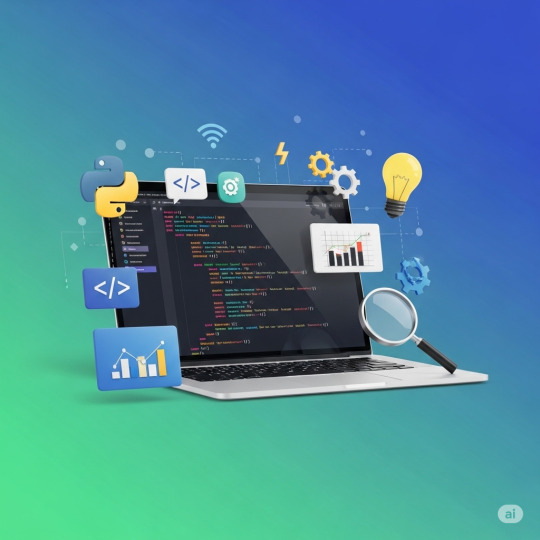
After completing your Python course, it’s essential to validate your knowledge through certification. Many online platforms and training institutes offer certifications that are recognized by employers. Some internationally acknowledged certifications include:
PCEP – Certified Entry-Level Python Programmer
PCAP – Certified Associate in Python Programming
Microsoft Python Certification
Having one or more of these certifications can greatly enhance your resume and increase your chances of landing a job in fields such as:
Software Development
Data Science
Artificial Intelligence
Backend Web Development
Automation Engineering
QA Testing
Cybersecurity
Final Thoughts
Python is more than just a programming language—it’s a gateway to some of the most exciting and lucrative careers in today’s digital economy. Its beginner-friendly nature, coupled with its wide range of applications, makes it the ideal first language for anyone looking to enter the world of coding.
If you're serious about upgrading your skills or stepping into the IT industry, start with Python. Learn the basics, build projects, earn a certification, and you'll find doors opening in web development, data science, AI, automation, and beyond.
And if you're located in or around Chandigarh, don’t miss the opportunity to enroll in a Python Training in Chandigarh program that provides hands-on learning, mentorship, and career guidance. Start your coding journey today by choosing the right python course in chandigarh that aligns with your goals.
Stay curious, keep coding, and let Python be the foundation of your digital future!
0 notes
Text
Build Tech Skills Early with Robotics Classes for Children UK

Why Robotics and Coding Matter for Today’s Young Learners
As the world around us becomes more tech-driven, preparing children with relevant skills is no longer optional — it's essential. In the UK, parents and schools alike are actively searching for engaging, practical, and meaningful ways to introduce children to technology from an early age. This is where robotics classes for children UK are making a significant impact.
From logical thinking to teamwork, hands-on robotics not only sparks curiosity but also builds a strong foundation in STEM. And when combined with real coding projects, these classes go beyond just screen time — they offer real-world learning.
At Pixelia, we offer structured and creative programs that focus on both robotics and artificial intelligence, designed specifically for young minds. Whether you're a parent looking to engage your child or an educator wanting to bring innovation to the classroom, we’re here to help.
Practical Coding Classes for Children in Manchester
For families based in Manchester and nearby areas, Pixelia runs dedicated coding classes for children in Manchester that combine fun, creativity, and real-world applications. Unlike one-size-fits-all online tutorials, our in-person sessions allow children to interact with robots, experiment with AI, and write their own code from scratch.
Each session is designed to be age-appropriate and goal-driven. Younger children start with the basics of block-based programming, while older students learn Python and get hands-on with real AI tools.
You can view our full robotics and AI course offerings and book your child’s seat on this page: 👉 Robotics & AI with Quarky – Pixelia
What Makes Pixelia Different?
At Pixelia, we’re not just teaching code — we’re preparing children for the digital world they’re growing up in. Here's what sets us apart:
Hands-On Learning: Kids build, code, and troubleshoot using real hardware like robots and AI devices.
STEM Certified Trainers: Our educators are highly experienced in delivering tailored programs that suit different age groups and learning styles.
Real Projects: Children work on mini-projects that apply what they've learned in fun, practical ways — from making smart robots to programming games.
Progressive Curriculum: We follow a step-by-step learning structure that adapts to each child’s pace, ensuring they stay engaged and confident.
FAQs – Parents Often Ask
Q: What age groups can join Pixelia’s classes? A: Our robotics and coding classes are suitable for children aged 6 to 16. The content and tools vary based on age and learning level.
Q: Do children need any prior coding experience? A: Not at all! Whether your child is a complete beginner or has some experience, our classes are designed to guide them step by step.
Q: Are there weekend or holiday options available? A: Yes! We offer weekend coding clubs, school holiday STEM camps, and after-school programs throughout Manchester and nearby towns.
Q: Where can I find more details about your robotics courses? A: Everything you need is on our robotics and AI program page — click here to explore.
Future-Ready Learning Starts Here
In today’s fast-paced tech world, giving children early access to coding and robotics isn’t just a bonus — it’s a step toward preparing them for the future. With robotics classes for children UK gaining traction and more families enrolling in coding classes for children in Manchester, now is the perfect time to give your child that advantage.
At Pixelia, we believe learning should be fun, hands-on, and future-focused. Whether your child is curious about robots, enjoys gaming, or just loves building things, we’ve got a course that fits.
📩 Interested in enrolling your child or learning more about our STEM programs? Visit our main Robotics & AI with Quarky page and get started today.
0 notes
Text
How Kids Can Start Learning Python with Fun Projects
Python is one of the best programming languages for kids to start with. It’s simple, versatile, and widely used in various fields, from game development to artificial intelligence. If your child is interested in coding, learning Python can be a great first step. But the best way to make coding enjoyable is through hands-on projects!
In this blog, we’ll explore how kids can start learning Python with fun coding projects, why it’s a great language for beginners, and some useful tips to keep them motivated.
Why Should Kids Start Learning Python?
1. Easy to Understand and Use
Python’s syntax is simple and similar to English, making it an excellent choice for Python for beginners. Kids don’t have to struggle with complicated symbols or difficult concepts when they start coding.
2. Widely Used in the Real World
Python differs from other beginner-friendly languages since its professional use spans across web development and artificial intelligence together with game design applications. Kids who start learning Python early can develop real-world skills.
3. Encourages Creativity
Coding is not just about logic; it’s about creativity too! With Python, kids can build their own games, animations, and even interactive stories. Fun coding projects keep them engaged while helping them develop problem-solving skills.
4. Strong Community and Resources
Python has a vast online community and numerous Python tutorials designed for beginners. Whether through online courses, books, or interactive platforms, kids have plenty of ways to learn.
How to Start Learning Python?
1. Get Familiar with Basic Python Concepts
Before jumping into projects, kids should understand fundamental Python concepts:
Variables and data types
Loops and conditionals
Functions and modules
Lists and dictionaries
These concepts are the building blocks for any Python project. Many free resources and Python tutorials online can help kids grasp the basics in an interactive way.
2. Start with Simple Python Projects for Beginners
Hands-on projects are the best way to reinforce learning. Here are some great Python projects for beginners that kids can try:
Project 1: Create a Simple Calculator
This project introduces basic math operations and user input in Python. Kids can build a simple calculator that adds, subtracts, multiplies, and divides numbers.
Project 2: Guess the Number Game
A great way to introduce logic and loops, this game lets the computer pick a random number, and the player has to guess it with hints.
Project 3: Rock, Paper, Scissors Game
This classic game helps kids understand conditional statements and randomness in Python.
Project 4: Story Generator
By using lists and random choices, kids can build a fun program that creates random and silly stories. This helps them learn about strings and lists while being creative.
Project 5: Drawing with Turtle Module
Python’s Turtle module allows kids to create shapes and patterns using simple commands. It’s a fun way to introduce graphical programming.
Tips to Keep Kids Motivated While Learning Python
Make It Fun with Games and Challenges Use interactive platforms like Scratch with Python or coding games to keep kids excited about learning.
Encourage Real-World Applications Show kids how Python is used in game development, automation, and AI. Let them experiment with their ideas.
Break It into Small Steps Avoid overwhelming them with too much theory. Let them build small projects before moving on to complex ones.
Join a Coding Community Encourage participation in online coding clubs or forums where kids can share projects and get feedback.
Where Can Kids Learn Python?
While self-learning is an option, structured learning can provide a better foundation. Platforms like Guruface offer Python coding classes for kids that guide them through concepts with interactive lessons and projects.
Why Choose Guruface for Python Learning?
Expert-Led Courses – Learn from experienced instructors who make coding fun and engaging.
Hands-on Projects – Kids get to apply what they learn in real Python projects for beginners.
Self-Paced & Interactive – Flexible learning schedules that fit every child’s pace.
Safe and Supportive Environment – A friendly platform that encourages kids to ask questions and experiment.
If you’re looking for structured guidance, enrolling in a Python coding class for kids can accelerate their learning and give them the confidence to take on more advanced coding challenges.
Final Thoughts
Learning Python is easier than ever for kids, thanks to its simplicity and engaging project-based learning. By working on fun coding projects, kids can develop essential problem-solving and creativity skills while having fun.
If your child is ready to take the next step, structured courses like the Python coding classes for kids on Guruface can provide expert guidance and hands-on experience. With the right tools and motivation, your child could be the next coding genius!
0 notes
Text
How to choose the right iT course for you (Beginner-Friendly Guide)
So, you’ve decided to jump into the world of IT , but now you’re staring at a long list of courses: Python, Full Stack, Digital Marketing, Cybersecurity, AI, and more. Feeling confused? You're not alone. 😅
Whether you’re a student, a job seeker, or someone thinking of a career switch, this guide will help you choose the right IT course step by step.
Step 1: Know Where You’re Starting From
First, take a deep breath and ask yourself:
Am I a complete beginner?
Do I have some experience in tech or coding?
Am I switching from a non-tech background?
✅ If you're totally new, don’t worry! Many IT courses are designed for beginners even if you don’t have a tech degree.
Step 2: Define Your Career Goal (Don’t Skip This!)
You don’t need to know everything today but having a goal helps. Ask yourself:
Do I want to build websites or apps? → Look into Web Development
Do I enjoy solving puzzles or logic problems? → Try Programming (like Python or Java)
Do I like visuals and creativity? → Explore UI/UX Design.
Am I interested in hacking and online safety? → Go for Cybersecurity.
Do I want to understand how AI tools like ChatGPT work? → Learn Artificial Intelligence or Machine Learning.
Pro Tip: It’s okay if your goals change later. The idea is just to have a direction.
Step 3: Test the Waters (Without Spending a Lot)
Before committing to a 6-month course, try:
Free YouTube tutorials
Free coding platforms like W3Schools, Sololearn, or FreeCodeCamp
Demo classes offered by local IT institutes in Jaipur.
Many institutes (including ours in Jaipur) offer 1-day trial classes. It’s a great way to know if you actually enjoy the subject.
Step 4: Choose a course That balances theory + practice
Don’t fall for buzzwords alone. A good IT course should offer:
Real-world projects
Doubt sessions with mentors
Placement assistance
Updated syllabus with trending tools (like Git, React, AI APIs, etc.)
👉 Ask for the course curriculum before joining. If it's only theory and not practical, walk away.
Step 5: Find a good training institute (Preferably Local)
Since you're in Jaipur (or nearby), choose a local institute that provides:
Offline + online flexibility
Peer learning or community groups
Certification + placement support
Real reviews from students
Bonus Tip: Visit the center, talk to current students, and ask about their experience.
Step 6: Budget smartly (But Don’t Go Too Cheap)
Yes, budget matters. But choosing the cheapest course can sometimes cost you more especially if:
There’s no real support or mentor
You don’t get help with job placement
The syllabus is outdated
Instead, look for value. Some good IT institutes in Jaipur offer EMI options, scholarships, or discounts for students.
Step 7: Think beyond the course— what’s next?
After your course, what support do you get?
Internship opportunities?
Mock interviews or resume help?
Freelancing guidance?
Ask these questions before enrolling.
Real-Life Story: "How I Found My Path with Python"
Rohit, a B.Com graduate from Jaipur, felt stuck working at a BPO. He always loved solving puzzles but didn’t think he could learn programming. He joined a 3-month Python course, built 2 mini projects, and landed a remote internship in data analysis—all within 6 months.
Moral? It’s not about your degree. It’s about taking the first step.
✅ Final Checklist Before You Pick a Course
I know my basic career interests (web dev, AI, design, etc.)
I’ve tried a free tutorial or demo class.
I checked the syllabus and projects included.
The institute offers real mentorship and support.
I’m clear about what comes after the course.
Still Confused? We’re Here to Help
If you're still unsure, don’t worry. Book a free counseling session with our team in Jaipur—we'll listen to your goals and help you find the right course .
Remember: You don’t need to know everything right now. You just need to start. The right course will open doors you didn’t even know existed.
#AI-ml COurse#Jaipur#Best it Course inn Jaipur#Skill BABU - It course in Jaipur#Choose IT Course in Jaipur
0 notes